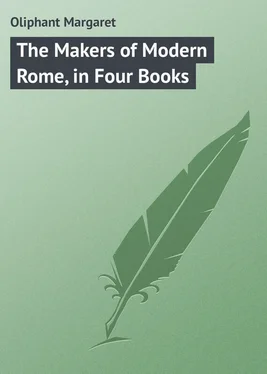Margaret Oliphant - The Makers of Modern Rome, in Four Books
Здесь есть возможность читать онлайн «Margaret Oliphant - The Makers of Modern Rome, in Four Books» — ознакомительный отрывок электронной книги совершенно бесплатно, а после прочтения отрывка купить полную версию. В некоторых случаях можно слушать аудио, скачать через торрент в формате fb2 и присутствует краткое содержание. Жанр: foreign_prose, на английском языке. Описание произведения, (предисловие) а так же отзывы посетителей доступны на портале библиотеки ЛибКат.
- Название:The Makers of Modern Rome, in Four Books
- Автор:
- Жанр:
- Год:неизвестен
- ISBN:нет данных
- Рейтинг книги:5 / 5. Голосов: 1
-
Избранное:Добавить в избранное
- Отзывы:
-
Ваша оценка:
- 100
- 1
- 2
- 3
- 4
- 5
The Makers of Modern Rome, in Four Books: краткое содержание, описание и аннотация
Предлагаем к чтению аннотацию, описание, краткое содержание или предисловие (зависит от того, что написал сам автор книги «The Makers of Modern Rome, in Four Books»). Если вы не нашли необходимую информацию о книге — напишите в комментариях, мы постараемся отыскать её.
The Makers of Modern Rome, in Four Books — читать онлайн ознакомительный отрывок
Ниже представлен текст книги, разбитый по страницам. Система сохранения места последней прочитанной страницы, позволяет с удобством читать онлайн бесплатно книгу «The Makers of Modern Rome, in Four Books», без необходимости каждый раз заново искать на чём Вы остановились. Поставьте закладку, и сможете в любой момент перейти на страницу, на которой закончили чтение.
Интервал:
Закладка:
Unfortunately it is not possible to leave out the Church in Rome when we collect the details of depravity and folly in Society. One cannot but feel how robust is the faith which goes back to these ages for guidance and example when one sees the image in St. Jerome's pages of a period so early in the history of Christianity. "Could ye not watch with me one hour?" our Lord said to the chosen disciples, His nearest friends and followers, in the moment of His own exceeding anguish, with a reproach so sorrowful, yet so conscious of the weakness of humanity, that it silences every excuse. We may say, for a poor four hundred years could not the Church keep the impress of His teaching, the reality of the faith of those who had themselves fallen and fainted, yet found grace to live and die for their Master? But four centuries are a long time, and men are but men even with the inheritance of Christians. They belonged to their race, their age, and the manifold influences which modify in the crowd everything it believes or wishes. And they were exposed to many temptations which were doubly strong in that world to which by birth and training they belonged. How is an ordinary man to despise wealth in the midst of a society corrupted by it, and in which it is supreme? how learn to be indifferent to rank and prestige in a city where without these every other claim was trampled under foot? "The virtues of the primitive Church," says Villemain of a still later period, "had been under the guard of poverty and persecution: they were weak in success and triumph. Enthusiasm became less pure, the rules of life less severe. In the always increasing crowd of proselytes were many unworthy persons, who turned to Christianity for reasons of ambition and self-interest, to make way at Court, to appear faithful to the emperor. The Church, enriched at once by the spoil of the temples and the offerings of the Christian crowd, began to clothe itself in profane magnificence." Those who attained the higher clerical honours were sure, according to the evidence of Ammianus, "of being enriched by the offerings of the Roman ladies, and drove forth like noblemen in lofty chariots, clothed magnificently, and sat down at tables worthy of kings." The Church, endowed in an earlier period by converts, who offered sometimes all their living for the sustenance of the community which gave them home and refuge, had continued to receive the gifts of the pious after the rules of ordinary life regained their force; and now when she had yielded to a great extent to the prevailing temptations of the age, found a large means of endowment in the gifts of deathbed repentance and the weakness of dying penitents, of which she was reputed to take large advantage: wealth grew within her borders, and luxury with it, according to the example of surrounding society. It is Jerome himself who reports the saying of one of the highest of Roman officials to Bishop Damasus. "If you will undertake to make me Bishop of Rome, I will be a Christian to-morrow." Not even the highest place in the Government was so valuable and so great. It is Jerome also who traces for us – the fierce indignation of his natural temper, mingling with an involuntary perception of the ludicrous side of the picture – a popular young priest of his time, whose greatest solicitude was to have perfumed robes, a well fitting shoe, hair beautifully curled, and fingers glittering with jewels, and who walked on tip-toe lest he should soil his feet.
"What are these men? To those who see them pass they are more like bridegrooms than priests. Some among them devote their life and energies to the single object of knowing the names, the houses, the habits, the disposition of all the ladies in Rome. I will sketch for you, dear Eustochium, in a few lines, the day's work of one of them, great in the arts of which I speak, that by means of the master you may the more easily recognise his disciples.
"Our hero rises with the sun: he regulates the order of his visits, studies the shortest ways, and arrives before he is wanted, almost before his friends are awake. If he perceives anything that strikes his fancy, a pretty piece of furniture or an elegant marble, he gazes at it, praises it, turns it over in his hands, and grieves that he has not one like it – thus extorting rather than obtaining the object of his desires; for what woman would not hesitate to offend the universal gossip of the town? Temperance, modesty ( castitas ), and fasting are his sworn enemies. He smells out a feast and loves savoury meats.
"Wherever one goes one is sure to meet him; he is always there before you. He knows all the news, proclaims it in an authoritative tone, and is better informed than any one else can be. The horses which carry him to the four quarters of Rome in pursuit of this honest task are the finest you can see anywhere; you would say he was the brother of that King of Thrace known in story by the speed of his coursers.
"This man," adds the implacable satirist in another letter, "was born in the deepest poverty, brought up under the thatch of a peasant's cottage, with scarcely enough of black bread and millet to satisfy the cravings of his appetite; yet now he is fastidious and hard to please, disdaining honey and the finest flour. An expert in the science of the table, he knows every kind of fish by name, and whence come the best oysters, and what district produces the birds of finest savour. He cares only for what is rare and unwholesome. In another kind of vice he is not less remarkable; his mania is to lie in wait for old men and women without children. He besieges their beds when they are ill, serves them in the most disgusting offices, more humble and servile than any nurse. When the doctor enters he trembles, asking with a faltering voice how the patient is, if there is any hope of saving him. If there is any hope, if the disease is cured, the priest disappears with regrets for his loss of time, cursing the wretched old man who insists on living to be as old as Methusalem."
The last accusation, which has been the reproach of the Church in many different ages, had just been specially condemned by a law of the Emperor Valentinian I., declaring null and void all legacies made to priests, a law which called forth Jerome's furious denunciation, not of itself, but of the abuse which called it forth. This was a graver matter than the onslaught upon the curled darlings of the priesthood, more like bridegrooms than priests, who carried the news from boudoir to boudoir, and laid their entertainers under contribution for the bibelots and ancient bric-a-brac which their hearts desired. Thus wherever the eye turned there was nothing but luxury and the love of luxury, foolish display, extravagance and emulation in all the arts of prodigality, a life without gravity, without serious occupation, with nothing in it to justify the existence of those human creatures standing between earth and heaven, and capable of so many better things. The revulsion, a revulsion inspired by disgust and not without extravagance in its new way, was sure to come.
CHAPTER II.
THE PALACE ON THE AVENTINE
The strong recoil of human nature from those fatal elements which time after time have threatened the destruction of all society is one of the noblest things in history, as it is one of the most divine in life. There are evidences that it exists even in the most wicked individuals, and it very evidently comes uppermost in every commonwealth from century to century to save again and again from utter debasement a community or a nation. When depravity becomes the rule instead of the exception, and sober principle appears on the point of yielding altogether to the whirl of folly or the thirst of self-indulgence, then it may always be expected that some ember of divine indignation, some thrill of high disgust with the miserable satisfactions of the world will kindle in one quarter or another and set light to a thousand smouldering tires over all the face of the earth. It is one of the highest evidences of that charter of our being which is our most precious possession, the reflection of that image of God which amid all degradations still holds its place in human nature, and will not be destroyed. We may mourn indeed that so short a span of centuries had so effaced the recollection of the brightest light that ever shone among men, as to make the extravagance of a human revulsion and revolution necessary in order to preserve and restore the better life of Christendom. At the same time it is our salvation as a race that such revolutions, however imperfect they may be in themselves, are sure to come.
Читать дальшеИнтервал:
Закладка:
Похожие книги на «The Makers of Modern Rome, in Four Books»
Представляем Вашему вниманию похожие книги на «The Makers of Modern Rome, in Four Books» списком для выбора. Мы отобрали схожую по названию и смыслу литературу в надежде предоставить читателям больше вариантов отыскать новые, интересные, ещё непрочитанные произведения.
Обсуждение, отзывы о книге «The Makers of Modern Rome, in Four Books» и просто собственные мнения читателей. Оставьте ваши комментарии, напишите, что Вы думаете о произведении, его смысле или главных героях. Укажите что конкретно понравилось, а что нет, и почему Вы так считаете.












